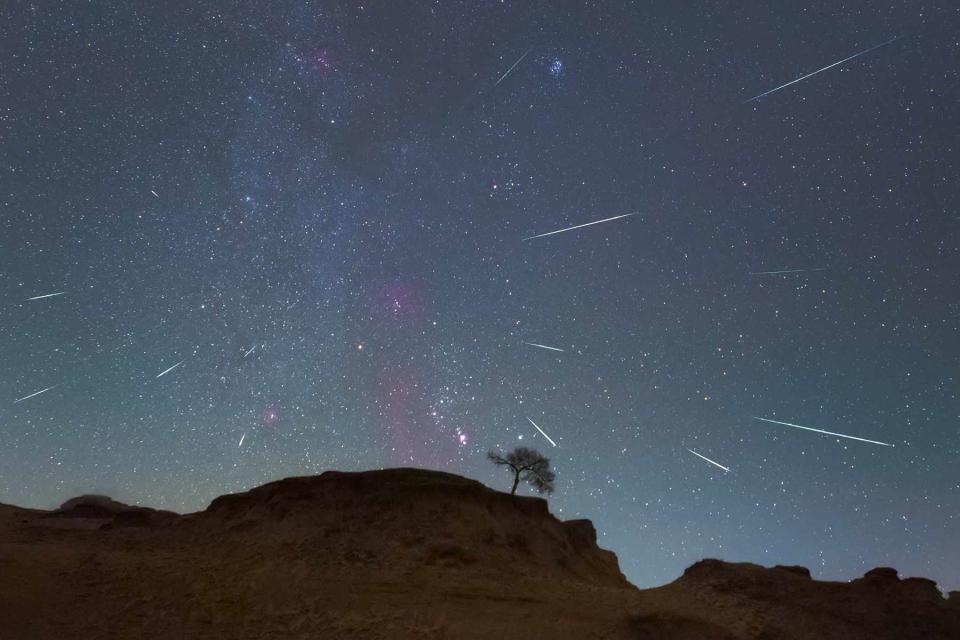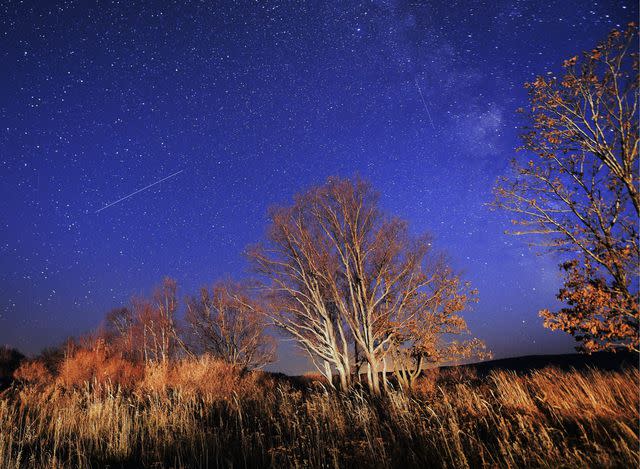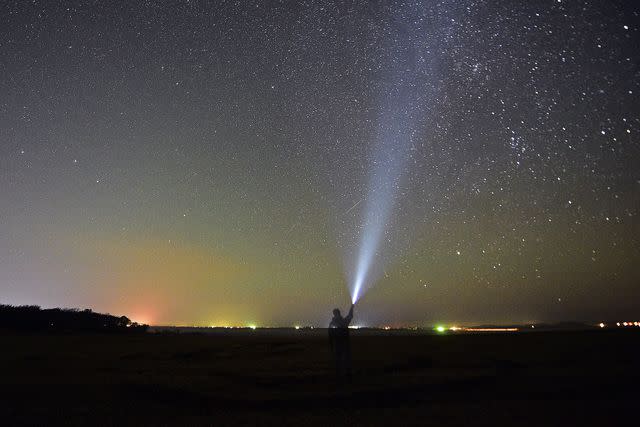Orionid Meteor Shower 2023: When It Peaks and How to Watch It
The end of the month sees the peak of the Orionids, a meteor shower that derives from Halley's Comet

Costfoto/Future Publishing/Getty Images
The Orionid meteor shower in ChinaComets, full moons, meteor showers — oh my!
An incredibly active solar system is present this month, with several extraterrestrial events taking place through Halloween night on Oct. 31.
The month kicked off with the Draconids, giving stargazers a spectacular display of fiery meteors that shot across the sky. That shower is known for its meteor "storms," a rarity that hasn't happened since 1946.
Next on the astronomical activity list is the Orionid meteor shower, expected to peak between Oct. 20 and Oct. 21. According to the American Meteor Society, however, they will remain active through Nov. 22 this year.
Related: Draconid Meteor Shower 2023: When It Peaks and How to Watch It
Viewing conditions are expected to be decent, as the moon is estimated to be 37% illuminated at the time of the shower's peak. Moon phases are critical when viewing meteor showers because the lunation can drown out the starry display.
Fortunately, this month's full moon — titled, the Hunter's moon — reaches its fullest phase on Oct. 28, coinciding with a lunar eclipse. Meteor showers are similar to lunations because celebrity astronomer Kyle Thomas tells PEOPLE they are both significant astronomically and energetically.
To find out what the Orionids mean in astrology and which zodiac sign this meteor shower aligns with, according to Thomas' readings, scroll on!
Related: Everything to Know About the Full Moons in 2023
Do the Orionids have astrological significance?

Although meteor showers have astrological significance, it's only relevant to an extent in comparison to moon phases.
Lunar eclipses "are three times more powerful and emotional" than the average lunation that occurs each month, Thomas — known for his cosmic guidance for celebrities, business executives and prominent influencers — tells PEOPLE.
"Technically speaking, a meteor shower doesn't have exact astrological relevance beyond the following information," he explains. "So it isn't exactly like a new moon or full moon" which mark "culminations, breakthroughs or breakdowns, triggering a crisis event that causes us to assess our most internal fears, feelings and actions."
According to Thomas — who's been studying mythology and astrology since he was eight years old — spotting a meteor shower or shooting star is "always indicative of luck, synchronicity, and good fortune."
Why? He says that "the reason people believe to 'wish on a shooting star' is because it has been said for many years throughout time that these moments are rare, thus giving someone a boost of luck."
Related: Everything to Know About the Full Moons in 2023
Which zodiac sign do the Orionids align with?
![(Photo: Jeffrey Sullivan [CC BY-NC-ND 2.0]/Flickr) The Orionids meteor shower provide the month's biggest show.](https://s.yimg.com/ny/api/res/1.2/aOoQg6cEMOE7OLseAnimJA--/YXBwaWQ9aGlnaGxhbmRlcjt3PTk2MDtoPTYxMQ--/https://media.zenfs.com/en/people_218/a24b0c001ca41dc16c68c9f915e307f3)
The Orionids appear to radiate from the Orion constellation. Betelguse is the name of the brightest star in the cluster, which Thomas says "brings great success but complications to those who focus upon it."
The Orion constellation is tied to the Taurus constellation. Thomas points out that the Taurus zodiac sign aligns with themes of "wealth, abundance, power and self-worth and romance through senuality." He says by "focusing on these ideas" as well as success and ambition "can aid us during these times."
Related: All About September's Harvest Moon and What It Means for Your Zodiac Sign
What does the Orionids constellation symbolize?

The Orion constellation was put on the map centuries ago, during the time of the ancient Egyptians.
"They worshipped the constellation not just as the beginning of life, but as a vision of life, maturation, and inevitable death," says Thomas, who adds that Orion was considered "a god" to the ancient people during that era.
As time progressed, Thomas says the Egyptians "watched Orion's constellation change" and believed that "it held ties to immortality." Many theologians and philosophers, he says, "liken the story of Orion to a god who dies, sacrificing himself for the greater good."
"Jesus Christ was eventually likened to this myth, portraying eternal truth and glory, thousands of years later," Thomas continues. "The ancient Greeks believed Orion was not just a God, but a giant. He could not be killed, even if he was tempted."
For more People news, make sure to sign up for our newsletter!
Read the original article on People.

